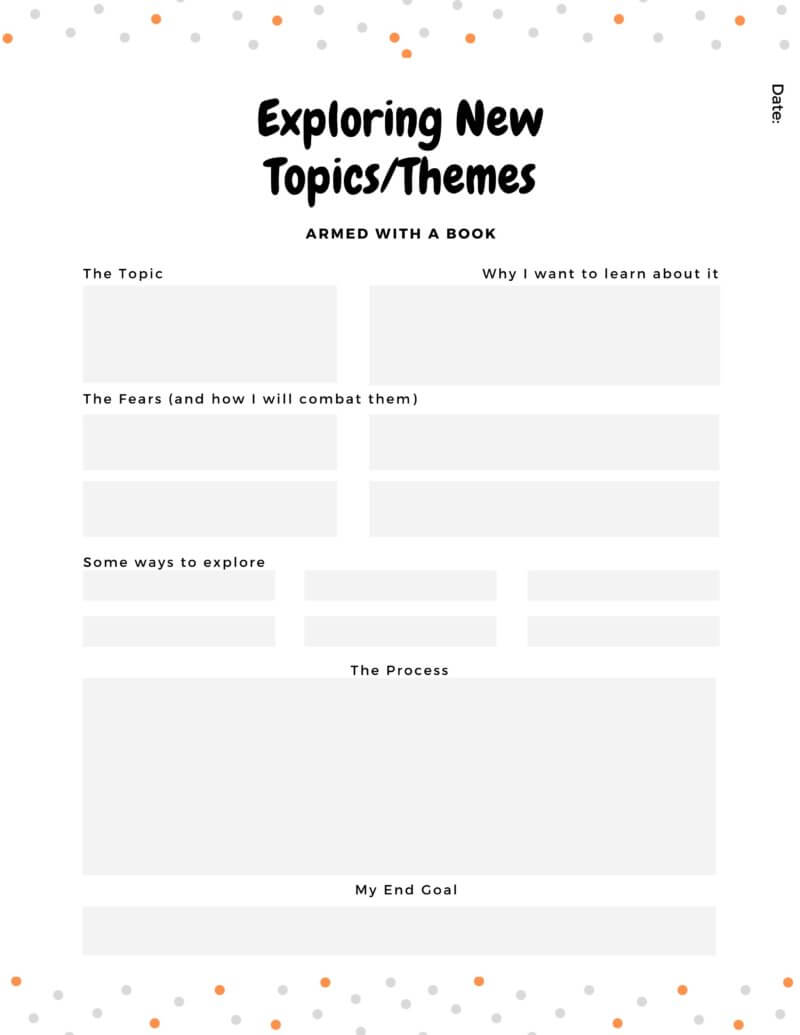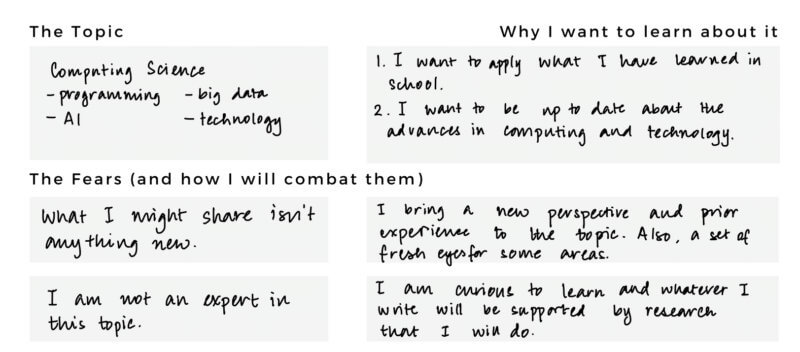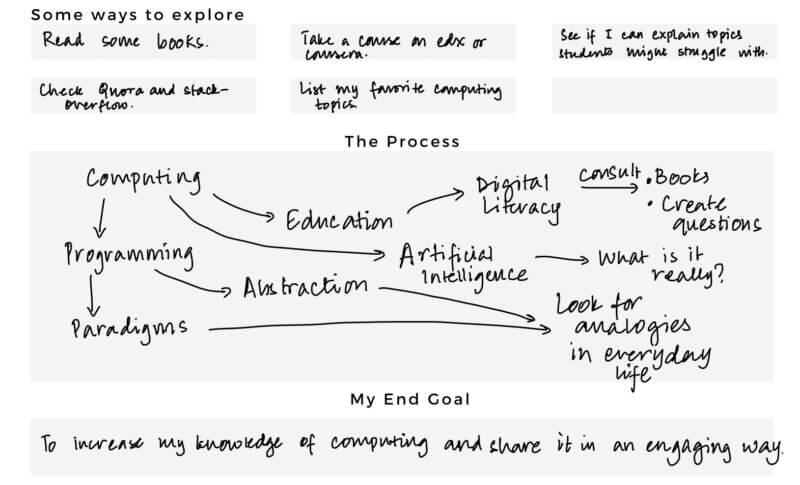Thinking of expanding your blog or about to start learning something new but not sure where to start? That happens and even though it might feel like a daunting task, ultimately, it is actually kind of fun to have the drive to explore something new. Recently, I have been thinking of the topics that I want to learn more about and share on Armed with A Book in the future.
But who am I to write about this? I am no subject-matter expert!
If this sounds anything close to the thoughts in your mind, you are in the right spot. I have been reading up about overcoming the fear of writing. Though most advice I found was catered towards writing a book and overcoming the writer’s block (that’s a bit different), there were some elements that apply to writing non-fiction articles as well. I was able to organize them into an action plan and am excited to share this template with you.
Note that this thinking exercise is not limited to writing: you can use it to create a concrete plan to learn anything new.
First things first, how is this different from the writer’s block? During a writer’s block, we feel stuck, most of the time on a partly developed idea. There is a lot of self-criticism happening there. We might be thinking of our readers and beating ourselves up about the writing we are doing, or just not impressed with the speed of creation. When starting out with a new topic, it’s a little bit similar because we still have our readers in mind, we just don’t know where to start. This is more about overcoming the fear of venturing into a new territory and discovering the self.

Let’s do this together – figure out a plan to get around the obstacles that might be stopping you from exploring something new. For each step, I will work along with you, showing my own example. Get a pen and paper ready, or start a fresh note on your device for this exercise! The template I am using is on the left and its download link is available at the end of the article.
# 1 Acknowledge the Hopes and the Fears
The Hopes
It’s natural to think about the ideas that you want to pursue but giving it words can be a powerful catalyst to start formulating a plan. Start off by answering two questions:
- What is the topic that you want to pursue? This can be a broad categorization or something very specific that you wish to pursue.
- Why do you want to pursue it? Maybe it’s interest that is driving you or you feel it is a topic that will bring you more audience. So, think deeply and state solid reasons as you why you wish to follow this thread of an idea.
The Fears
It isn’t enough to state what you want to do, though. It is equally important to state the fears that are stopping you. Jeff Elkins mentions how he exercises naming his fears to combat them. One of the important lessons I learned from Manage your Day-to-Day was to stop the self-sabotage. The voice in my head that stops me from pursing ideas is making excuses on my part to not put time into things I want to pursue. Thus, acknowledging the self-sabotage mechanisms and having a clear answer back can be very helpful to fight these thoughts when they come.
Remember that you are starting something new. You are not supposed to be an expert about it. I am thinking about learning more about personal finance and stocks and there is no way that in my first article, I will know everything. I research the Internet for articles because I want to learn things. Some of the best articles I have read have been where people have explained their journey and evolution of their understanding about the topic.
Think like a learner. What is the best case scenario if you pursue the ideas you have written further as well as the worst-case scenario?

# 2 Take it to the Sandbox
The Writer’s Sandbox is a place where you explore ideas without any pressure. There is no time limit and the accomplishment at the end of the day is getting the time to follow the thought you wanted to pursue, or its tangents, wherever that leads. The sandbox is a safe place where you can just be, no chances of failure.
What are some fun ways in which you can explore the ideas that you have written down?
When my significant other, Clinton, was deciding whether he wanted to learn coding or not, he took a free online course about it. It didn’t take him very long to figure out if that it wasn’t something he wanted to pursue further. Before committing to a topic and planning out a whole bunch of articles about it, it is a good idea to explore it and see if it is really for you. You could:
- Take an online course or watch some videos on youtube about the topic. Before trying to be the expert, be the learner.
- Check out trendy topics on the Internet.
- Read something and summarize it in some way, maybe a poster or an infographic, or write a poem! This is your creative time!
# 3 Focus on the Process
Sage Cohen in the Writer’s Digest mentions how one should focus on the process rather than the fears. When a problem is broken down into a series of questions or concerns, it is easier to tackle them and make progress. Similarly, exploring a new theme in your writing is no different.
It is time to create a learning plan! This can be in the form of a mind map if the topic is quite broad, like the one I created below, or it could be a flowchart or a series of steps that have to followed in a certain order.
Some possible steps could be:
- Researching the topic
- Looking through your old notes or bookmarks to see what you already have on it.
- Contacting some people who could provide you with guidance.
- Find people on Twitter or other social media who might be willing to help.

# 4 Remember the End Goal
Look again at what you put down under ‘Hopes’ and come up with an end-goal from there. Maybe you already wrote it there, but take this space to summarize it in one powerful sentence.

Like I said earlier, this is an opportunity to learn. Nothing you note down right now will go waste. I say this because at the end of this exercise, even if you do not want to pursue the topic at all, you would have a clearer idea about what it would take it to attempt it sincerely. You might not be ready right now, but you have made progress already and a couple months or years from now, this brainstorming session will come in handy, when you are looking for something fresh to try out.
Woho! You have reached the end of the exercise! Now sign it, date it and pin it to your working station or file it away for later. 🙂

Most importantly though… Enjoy
There is much pleasure in writing for pleasure and I absolutely love the act of writing because it gives me an opportunity to explore my learning in new ways, consolidating other people’s ideas and my own experiences. If you liked this way of brainstorming, you can download the template here for future use. I would love to hear innovative ways in which you used the template!
Still not sure if you have a rock-solid plan? Contact me or comment below and let’s talk about it. I hope I can be of some help!

Be First to Comment